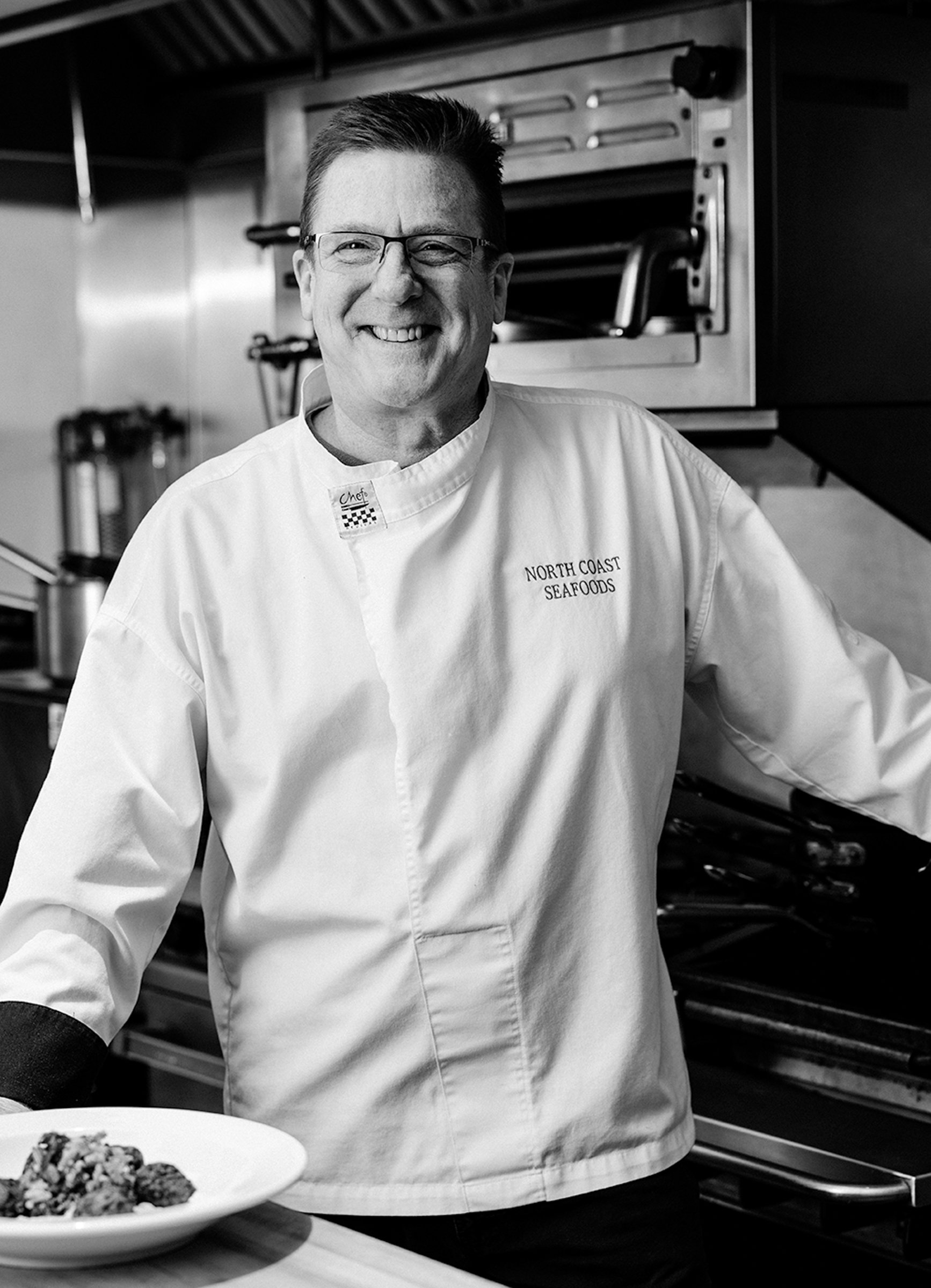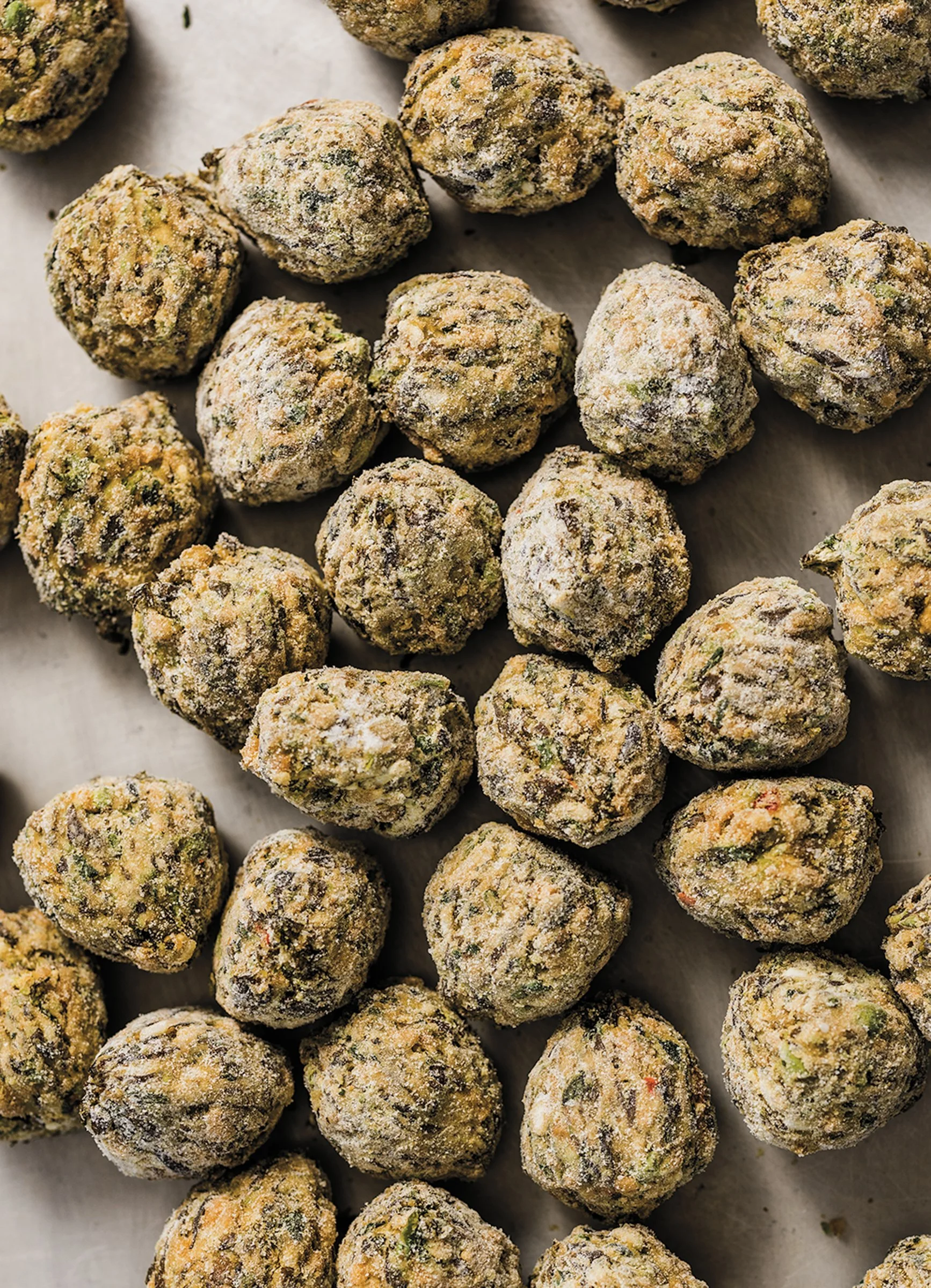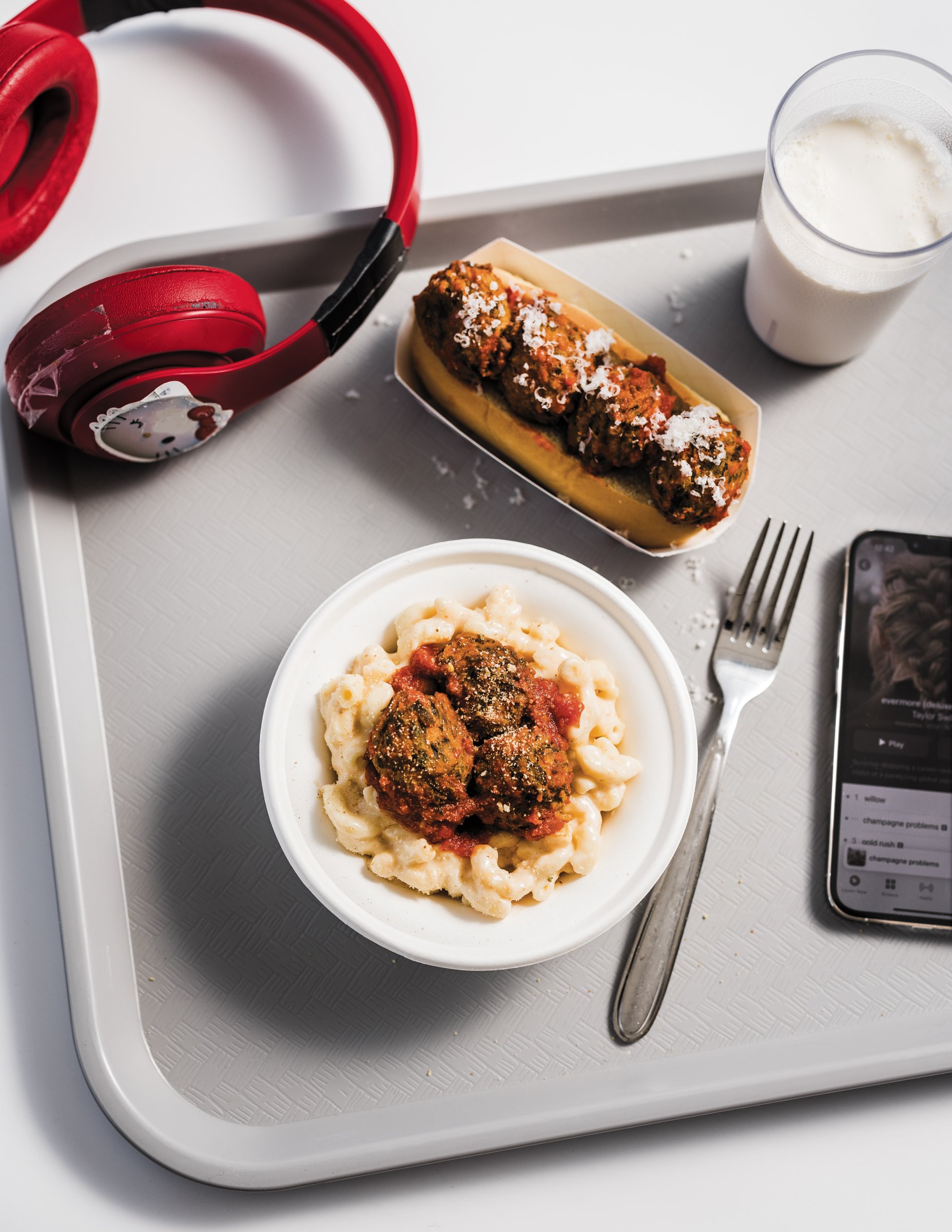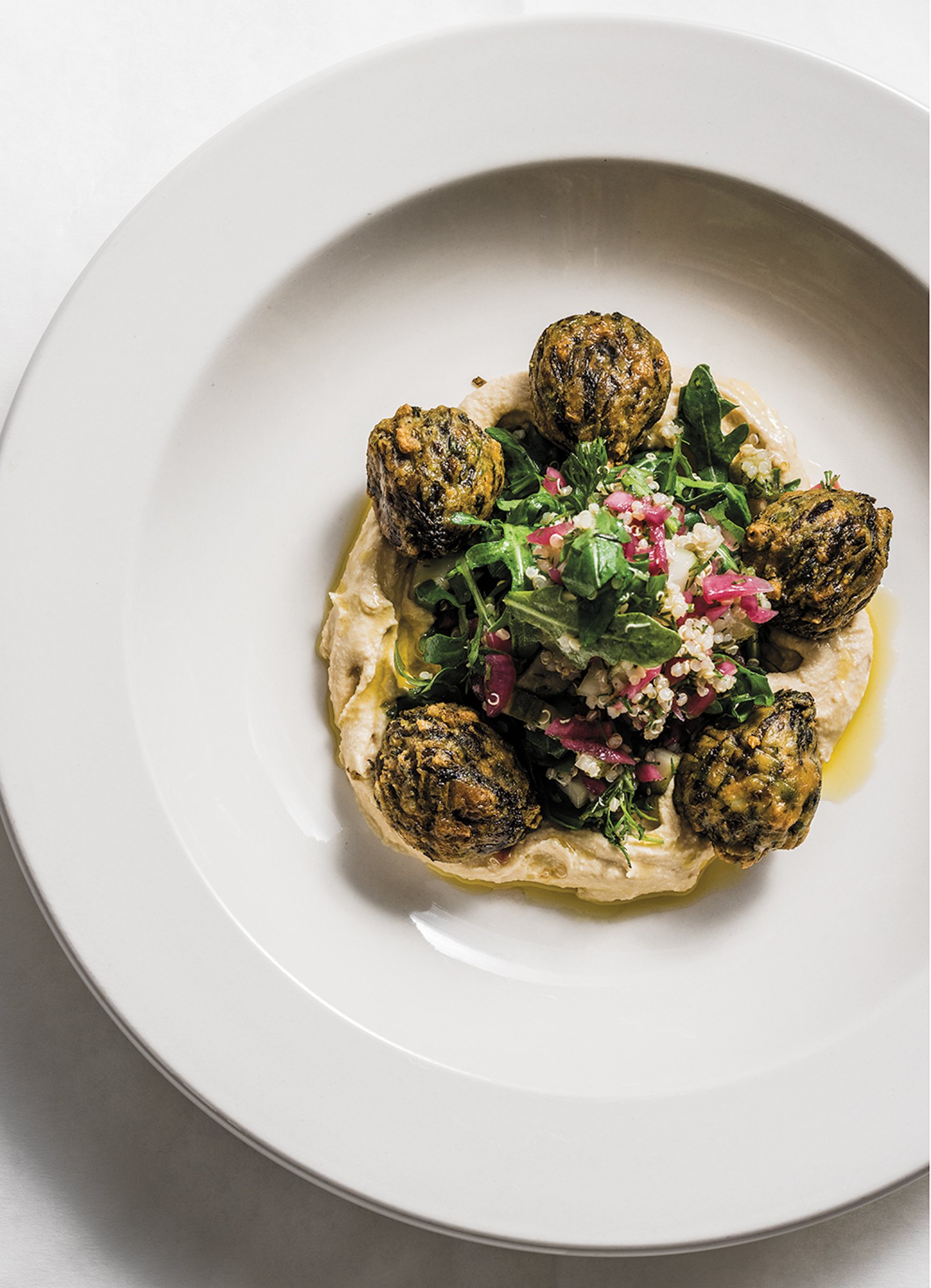Eat Your (Sea) Veggies: North Coast Seafoods and Atlantic Sea Farms Collaborate to Bring Edible Kelp Into the Mainstream
Photos by Michael Piazza
Lunch starts early at Belmont High School, which shares a campus with the town’s middle school. In order to feed the combined 2,200 students, the first of five services begins at 10:39am. On a sunny but brisk Monday morning, a surprisingly orderly group of teens lines up and waits patiently to file through and make their selections from an impressive variety of choices. The vegetarian option today (there is at least one every day) is kelp “meatballs” over wholewheat pasta with marinara sauce, and a side salad.
The kelp balls, along with salmon-kelp Ocean Burgers, are products of a collaboration between North Coast Seafoods, a Boston-based seafood supplier, and Atlantic Sea Farms, a seaweed farming company based in Biddeford, Maine. Andrew Wilkinson, who is the in-house seafood specialist and chef director of research and development for the family-owned North Coast, created the items during the early days of the Covid pandemic using kelp he purchased from Atlantic Sea Farms.
A chef with three decades of experience in restaurant kitchens in Europe, Asia, New York City and Boston, Wilkinson has been at North Coast for 10 years. He explains that much of his job is devoted to new product development to keep North Coast’s customers— many of whom are local chefs and national retailers—“knowledgeable about the seafood market.” When restaurants and other institutions went into Covid lockdown, Wilkinson had time to pursue an idea he had had percolating for a few years.
“I was aware of what Atlantic Sea Farms was doing, their mission to bring kelp to the front burner,” says the proud Maine native. “As a chef, in my opinion, the best way to do that is to make it into what we call the center of the plate.”
As a food source, kelp is “super nutrient-dense,” explains ASF CEO Briana Warner. It is high in iodine, magnesium, potassium, vitamins and antioxidants. Chefs, industrial food producers and home cooks can add it to everything from smoothies to vegetarian entrees for a nutritious boost and briny kick.
In late 2021, after getting sign-off from North Coast principals to pursue his project, Wilkinson ordered kelp online, five to six pounds at a time, from Atlantic Sea Farms. Then, he says, “I locked myself in my test kitchen. I wanted to make something for K–12 schools and bring it to the masses.” Over the next three months, he developed seven products—basil pesto and ginger sesame kelp burgers, “seaweedish” meatballs, jalapeño kelp poppers, kelp tater tots, kelp arancini and kelp-melt-aways—and taste-tested them among his colleagues. Then he contacted Warner, whom he did not know yet, and offered to cook lunch for her and her staff.
Wilkinson and Marketing Manager Christian L’Heureux loaded a car with kelp creations and drove to Biddeford, where the chef won over an initially apprehensive audience.
“It’s been really exciting to see how [Wilkinson] is innovating,” says Warner. In addition to Wilkinson’s food, the two connected over their business’s shared commitment to sustainability and building a more climate-friendly future that includes wild harvest seafoods as well as farmed seafoods like kelp.
Before joining Atlantic Sea Farms, Warner worked at Maine’s Island Institute, looking into opportunities for fishermen to diversify their income in the off-season. The Gulf of Maine is warming faster than almost all of the world’s oceans, posing an enormous threat to the state’s vital lobster industry. “Just a few more degrees in the water and larvae are not going to be able to survive at the rate that they are now,” she says.
Her work at Island Institute led Warner to Atlantic Sea Farms, where she directs the effort to build an industry for kelp. “We are totally focused on creating a market and a supply chain for the kelp that allows [the fishermen] to take advantage of the opportunity to be the leaders in the industry,” she says. Currently, a significant majority of farmed seaweed in the U.S. comes from Atlantic Sea Farms, led by Maine fishermen.
Kelp is a zero-impact crop that does not require any fertilizers or pesticides. And it helps mitigate some of the effects of climate change, particularly at a local level. “When we take it out of the water, we remove the carbon and nitrogen with it. It is the most climate- friendly food on the planet you can eat, and it also helps fishing communities adapt to climate change,” Warner notes.
In addition to working with fishermen, Atlantic Sea Farms processes kelp and develops products like seaweed salads, kelp cubes to add nutrition to smoothies, and kelp powder and flakes that can enhance baked goods, soups and sauces. After his successful lunch, Wilkinson worked with ASF’s culinary staff to adapt his ginger sesame and basil pesto burger recipes for mass production.
For the education market, Wilkinson produces roughly 5,000 pounds of kelp balls, which include green chickpeas, brown rice, pea protein and spices, and salmon-kelp burgers daily. He has also become a self-described “one-man show, the kelp ambassador,” introducing students and school dining service workers across the country to the environmental and health benefits of seaweed.
Boston College, in Chestnut Hill, was the first school to offer the kelp balls, beginning with a pilot program in spring 2023. “We have always worked really hard to try to do really innovative and fun things, particularly related to sustainability,” says Director of College Dining Services Beth Emery, who has had a long-term relationship with North Coast.
Now kelp meatballs are on the menu in three of BC’s 14 dining locations. Student sustainability interns have been instrumental in driving acceptance of the relatively new item, handing out samples and creating educational handouts and posters about kelp. They encourage their peers to try it, explaining the benefits both to the environment and their own health.
One BC café, focused on healthy, plant-forward food, serves kelp balls as part of its “Cousteau bowl,” on a base of saffron rice with arugula, roasted red pepper hummus, kalamata olives, pickled onions, pita crisps and tomato cucumber salad. They also are available on their own, as a side dish. Another dining hall offers the seaweedish meatballs with marinara sauce and pasta every Monday.
Emery admits that acceptance has been slower than she would like, but she and her interns are planning a big push for spring, focusing on more education and more samples. “Most students, when they try it, are pleasantly surprised,” she says.
Cambridge Public Schools was another early adopter. Wilkinson brought samples to Mellissa Honeywood, director of food and nutrition services for the school system, who he says “has always been a fan of my innovations in seafood sustainability.” Honeywood, who says she loved the kelp balls right away, introduced Wilmington to the students driving Cambridge Rindge & Latin School’s Green Plate Project, dedicated to sharing and prioritizing the climate benefits of adopting a vegan lifestyle. Wilkinson became a mentor to the group.
The kelp balls first appeared on the menu in late May 2023. “When it came time to launch, the students were there,” Honeywood says. “It keeps building forward. Once you establish that reference point for students, there’s nowhere to go but up.”
At Cambridge Rindge & Latin, “kelp bites” enhance a quinoa salad and are offered with tzatziki sauce. Occasionally they appear over pasta with a marinara sauce. “We have them available daily and students are always asking for more,” Honeywood says. A week after they were introduced at the high school, they were rolled out to K–8 students, as a vegan substitute for fish tacos.
“One of the silver linings from the pandemic is that it has caused a new sense of awareness around just how fragile our food system is and how precarious and how closely knit to the environment,” Honeywood says. “I am impressed and amazed by the students and how deliberate they are about their choices. They are articulate with their actions and their values and they want to see that reflected. It is our responsibility as adults stewarding the next batch of citizens of the planet that we give them that opportunity.”
In Belmont, Director of Nutrition Services Jackie Morgan introduced salmon kelp burgers and kelp balls to the upper schools in fall 2023. A school food services professional for 38 years, Morgan was a longtime North Coast customer and was intrigued by an email she received from Wilkinson about his forays into seaweed. She had an opportunity to see him and taste the kelp balls at a Massachusetts Department of Education spring conference. At a demo at Belmont high and middle schools in December, Wilkinson talked to students about how lobster fishermen in Maine are starting to farm kelp, and shared raw kelp for the students to see and touch.
The kelp items have been popular menu additions. Four of the seven girls at one table on a sunny Monday are enjoying their seaweedish meatballs and pasta. “As opposed to other meat alternatives, they kind of taste the best,” offers Nihara [none of the students offer last names]. “The kelp flavor comes through. They’re well-seasoned.” “I don’t like meatballs, but they have a fun taste,” adds Abby, seated next to her. Before trying Wilkinson’s briny creations, Morgan says, “My first exposure to seaweed was salads at Japanese restaurants. I never imagined kelp in schools. Because Andrew was here and exposed them to it, it opened up the doors.”
At Blue Hill Consolidated School, in Blue Hill, Maine, fifth graders were the first to try kelp balls, as part of a seaweed curriculum developed by several organizations, including the World Wildlife Fund and Maine Aquaculture Innovation Center. Educator Nell Herrmann is leading the program at Blue Hill. Wilkinson participated in the summer Zoom workshop that trained teachers for the course. “I was really impressed with what he had to say,” Herrmann recalls. She contacted him after the session, and he sent some food samples to the school.
A science teacher for 24 years, Herrmann is in a new role as an enrichment teacher, focusing on school-wide themes. Interestingly, she notes, the idea of eating and growing seaweed was new to most of her students. “None of them, including kids of lobster fishermen, had heard of kelp farming. They were super interested in all of it.” When she served the kelp balls, “They loved them. They went crazy for them.”
Herrmann hopes to collaborate with the school’s chef to introduce the kelp balls to the rest of the school’s pre-K–8 population. At minimum, if they don’t make it to the main menu right away, she says a March “seaweed week” is another opportunity to share them with more students.
Wilkinson says he is now sending his kelp products to schools in all six New England states, as well as New York, Virginia, North Carolina, Texas, Minnesota, Indiana and Colorado. And the list is growing.
“People are increasingly excited about our work, our food and what we’re doing,” says Warner. “Andrew working through the K–12 means we’re getting kids more nutrient-dense foods that are also making for a better planet. You see all these young consumers demanding a better food system and to me that speaks for a really good future for kelp.”
atlanticseafarms.com
northcoastseafoods.com
This story appeared in the Spring 2024 issue.





